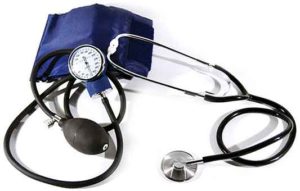 A link between high blood pressure and sexual problems is proved: men with untreated high blood pressure have poorer penile blood flow than those with normal blood pressure, according to research presented at ESC (European Society of Cardiology) Congress 2020.
A link between high blood pressure and sexual problems is proved: men with untreated high blood pressure have poorer penile blood flow than those with normal blood pressure, according to research presented at ESC (European Society of Cardiology) Congress 2020.
Women with high blood pressure can have reduced blood flow to the vagina, this leads to a decrease in sexual desire or arousal, vaginal dryness, or difficulty achieving orgasm.
Over time, high blood pressure damages the lining of blood vessels and causes arteries to harden and narrow (atherosclerosis), limiting blood flow.
For men this means less blood is able to flow to the penis: the decreased blood flow makes it difficult to achieve and maintain erections.
High blood pressure can also interfere with ejaculation and reduce sexual desire, but sometimes the medications used to treat high blood pressure have similar effects.
Hypertension (high blood pressure) affects more than one billion people worldwide and is the leading cause of premature death.
A healthy lifestyle is advised, including salt restriction, alcohol moderation, exercise, weight control, and smoking cessation.
Most patients also require drug treatment, which is linked to reduced risks of death, stroke, and heart disease – but around half of patients do not take their pills. Sexual dysfunction is one reason why patients stop medication.
Men with hypertension are almost twice as likely to have impaired penile blood flow and erectile dysfunction compared to men with normal blood pressure.

Disfunzione erettile
Erectile dysfunction is an early warning sign of damaged blood vessels.
However, previous studies have shown that erectile dysfunction is more common in treated, than untreated, men with high blood pressure.
Certain antihypertensive drugs – notably diuretics and beta blockers – have been linked with deterioration in sexual function.
High blood pressure medications that can cause sexual dysfunction as a side effect include:
Water pills (diuretics). Diuretics can decrease forceful blood flow to the penis, making it difficult to achieve an erection.
They can also deplete the body of zinc, which is necessary to make the sex hormone testosterone.
Beta blockers. These medications, especially older generation beta blockers such as propranolol (Inderal, Innopran XL), are commonly associated with sexual dysfunction.
The new study presented at ESC (European Society of Cardiology) Congress 2020 examined the association between blood pressure level and penile blood flow, and whether blood pressure-lowering medication had an effect on the relationship.
The study included 356 men with erectile dysfunction and no history of diabetes or cardiovascular disease who attended a clinic between 2006 and 2019.
The cohort was divided into three categories according to blood pressure: normal, high-normal, and hypertension.
A total of 164 (46%) patients were being treated with antihypertensive medications.
All patients underwent a penile colour Doppler ultrasound which is the standard method for evaluating penile blood vessels and erectile dysfunction.
The method involves injecting a drug into the base of the penis to open the blood vessels then measuring blood flow.
Penile blood flow is considered impaired when the velocity is lower than 25 cm/s.
Among men not receiving antihypertensive medication, penile blood flow velocity progressively decreased with rising blood pressure – i.e. blood flow was fastest in those with normal blood pressure, slower in those with high-normal blood pressure, and slowest in those with hypertension.
In contrast, among men taking antihypertension therapy, there was no difference in penile blood flow velocity between the three blood pressure categories.
“The progressive decrease in penile blood flow velocity across the three blood pressure categories in men not taking antihypertensive medication indicates significant structural changes in the penile blood vessels from longstanding hypertension,” said study author Professor Charalambos Vlachopoulos of the National and Kapodistrian University of Athens, Greece.
An additional analysis compared treated and untreated men within each blood pressure group.
In the hypertension category, treated and untreated patients had similar penile blood flow velocities.
However, in the high-normal category, treated men had worse penile blood flow than untreated men.
Similarly, in the normal blood pressure category, treated men had worse penile blood flow than untreated men.
Professor Vlachopoulos said: “These results imply that hypertensive patients already have significant structural damage in the penile arteries and adding antihypertensive drugs does not further reduce penile blood flow.
But in men with normal or high-normal blood pressure, the penile arteries have minimal structural damage and medications could have a negative impact on penile blood flow.”
He urged men with concerns about sexual dysfunction to discuss it with their doctor.
“For men with as yet untreated hypertension, older medications (beta blockers and diuretics) are not ideal and should be used only if absolutely indicated,” he said.
Professor Vlachopoulos noted that changing hypertensive medications in men with erectile dysfunction must be handled with caution.
He said: “First, if a co-existing disease dictates using a specific drug category (for example, beta blockers for coronary artery disease and heart failure, diuretics for heart failure), then switching is not advocated.
Medications less likely to cause sexual side effects
If sexual side effects persist, ask your doctor about other medication options.
Some high blood pressure medications are less likely to cause sexual side effects, such as:
Angiotensin-converting enzyme (ACE) inhibitors
Calcium channel blockers
Angiotensin II receptor blockers
To help your doctor select the most appropriate medication for you, tell him or her all the other medications you’re taking now — including herbal supplements and over-the-counter drugs. Sometimes a particular combination of medications or supplements contributes to sexual problems.
Alternatives might be considered if patients are at risk of stopping lifesaving therapy because of the detrimental impact of erectile dysfunction on their life.”
“Second, switching to another drug class does not guarantee either the restoration or improvement of erectile function. This has to be carefully explained to patients in advance to avoid unreasonable expectations,” he said.
Professor Vlachopoulos concluded: “Our study shows that high blood pressure can be treated without causing erectile dysfunction. Patients and doctors need to have open discussions to find the best treatment option.”
Erectile dysfunction drugs and high blood pressure
Men considering medications for erectile dysfunction should check with their doctor first. It’s usually safe to combine the erectile dysfunction drugs sildenafil (Revatio, Viagra), vardenafil (Levitra, Staxyn) and tadalafil (Adcirca, Cialis) with high blood pressure medications.
Taking these drugs with nitrates, taken either regularly for chest pain or in an emergency setting, can cause a dangerous drop in blood pressure.
Women
High blood pressure’s effect on sexual problems in women isn’t well-understood.
High blood pressure can reduce blood flow to the vagina. For some women, this leads to a decrease in sexual desire or arousal, vaginal dryness, or difficulty achieving orgasm.
Like men, women can experience anxiety and relationship issues due to sexual dysfunction and should talk to their doctor if they experience these difficulties.
In a study of 417 sexually active women aged 31 to 60, women with high blood pressure were twice as likely to experience sexual dysfunction compared with their counterparts who had normal blood pressure.
What’s more, advancing age and duration of high blood pressure further increased the risk of sexual dysfunction in women.
The study was presented at the 21st Annual Scientific Meeting of the American Society of Hypertension (ASH 2006) in New York City.
“Blood Pressure, Sexual Activity, and Dysfunction in Women With Hypertension: Baseline Findings From the Systolic Blood Pressure Intervention Trial (SPRINT)”, a research published on The Journal of Sexual Medicine (September 01, 2016), aimed to assess the association between systolic blood pressure (SBP) and other variables, and sexual activity and sexual dysfunction in hypertensive women, found that younger age, higher education, living with others, and higher weekly alcohol consumption were significantly associated with higher odds of being sexually active in a sample of middle-aged and older women with hypertension.
Increased depressive symptoms and increased physical comorbidities were significantly associated with increased odds of sexual dysfunction.
Systolic blood pressure was not significantly associated with sexual activity or sexual dysfunction.
See also:
To lower blood pressure the effect of exercise appears similar to that of commonly used antihypertensive medications (2020-07/05)
Link…
Interactions between grapefruit and drugs (2019-06-12)
Link…
For more information
European Society of Cardiology ESC
Link…
Mayo Clinic
Link…
High blood pressure and sex: Overcome the challenges
Link…
The Journal of Sexual Medicine
“Blood Pressure, Sexual Activity, and Dysfunction in Women With Hypertension: Baseline Findings From the Systolic Blood Pressure Intervention Trial (SPRINT)”
Link…
MDN
This post is also available in:
 Italian
Italian


